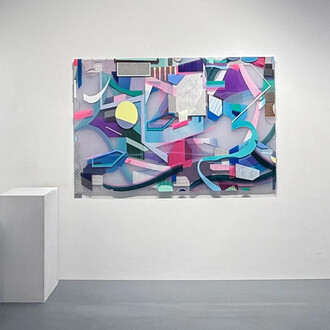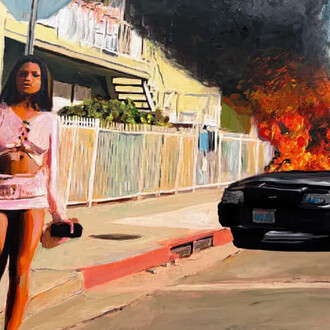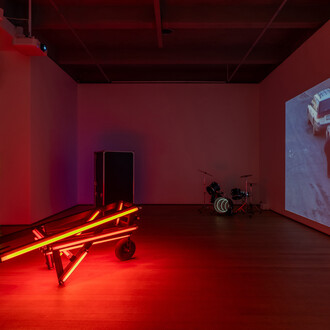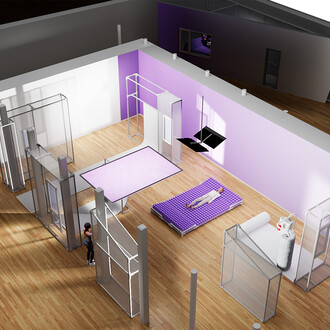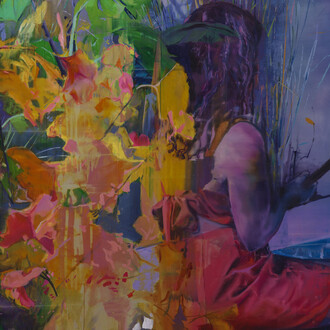On the Edge of the Wilds, a new exhibition of works at 532 Gallery Thomas Jaeckel, features five artists who each make use of a distinct set of materials, methods, and artistic concerns to create works that reflect a sense of ambivalence about modern culture and our relation to nature at a time when both are in a precarious state of flux.
Seattle-based collaborative duo Electric Coffin (artists Duffy de Armas and Stefan Hofmann) have fabricated four works that look something like gigantic stickers peeled from the deck of a gargantuan hipster’s skateboard. Each image provides the odd pairing of an animal with a disproportionately small vehicle perched on its back: in one, a racing greyhound carries a diminutive camper shell, while another shows a swimming polar bear serving as a ferry for the Space Shuttle. Although the meanings of these mash-ups are elusive, their bright, industrial colors and sleek, contemporary materials (back-painted glass, acrylic resin, holographic film) seem to gesture obliquely toward the idea that today the entirety of nature and culture form one vast junk pile of free-floating bits and pieces waiting to be refashioned into an endless series of slick, cool commodities through a never-ending process of recombination and remixing.
Amy Wilson presents four new knit and crochet pieces that reference traditional women’s crafts, political manifestos, and the general doom, gloom, and uncertainty of 2019. In the two-piece installation Hidden from view and We know suffering, a wall-mounted banner and a free-standing yarn-covered tree sculpture contain quotes from Anne Sexton, Mary Kelly, Patty Hearst, Audre Lorde, and others, along with more concise and pointed comments that reflect stubborn clichés on women’s madness and suffering. In two more banners (War is work, work is war and I have more faith in the end of the world than I do in anything else), Wilson uses quilt-like arrangements of her own words alternating with more abstract and traditional decorative elements to address the same subjects.
In a set of four recent oil paintings that include the aptly-titled Jungle and three floral still lifes embedded within undulating, wavelike backgrounds, German artist Lennart Rieder seems to point toward the profound gulf between humanity and the natural matrix from which we once emerged. The first painting’s almost photorealistic view through a dense, verdant barricade of lush vegetation into dark and forbidding jungle depths hints at profound sylvan mysteries forever denied to more sophisticated creatures who are inescapably trapped in the bright, gilded cage of civilization. In contrast, the other three, which depict carefully curated arrangements of fragile wildflowers in elegant vases, seem almost like a faint mockery of our desire to return to a state of Arcadian innocence without surrendering our troubling desire to dominate and posses nature.
Finally, Cuban artist Elio Rodríguez returns to Jaeckel Gallery with a selection of his wall-mounted monochromatic soft sculptures. In these works, Rodríguez assembles forms that initially read like whimsical semi-biomorphic riffs on 20th century Abstract Expressionist sculpture, as in Tropical Garden #1 and Goldie #2 (both 2018), which almost feel like a playful synthesis of Louise Bourgeois and John Chamberlain. Given time and attention, though, they begin to reveal complex allusions to nature’s exuberant fecundity, the artist’s complex relationship to his own Cuban identity, and the stereotypes that many North Americans have about tropical cultures. In Puzzle (2016), an arrangement of nine rectangular and square pieces (eight white and one brown) juxtaposes soft, puffy, tentacular shapes with recognizably mass-produced elements like zippers, padlocks, and boot laces, creating a subtle visual and psychological tension between the organic and the manufactured. Although all of these works are patently artificial in their materials and construction, they also embody the artless power of nature in all its self-assertive, unselfconscious grandeur.





